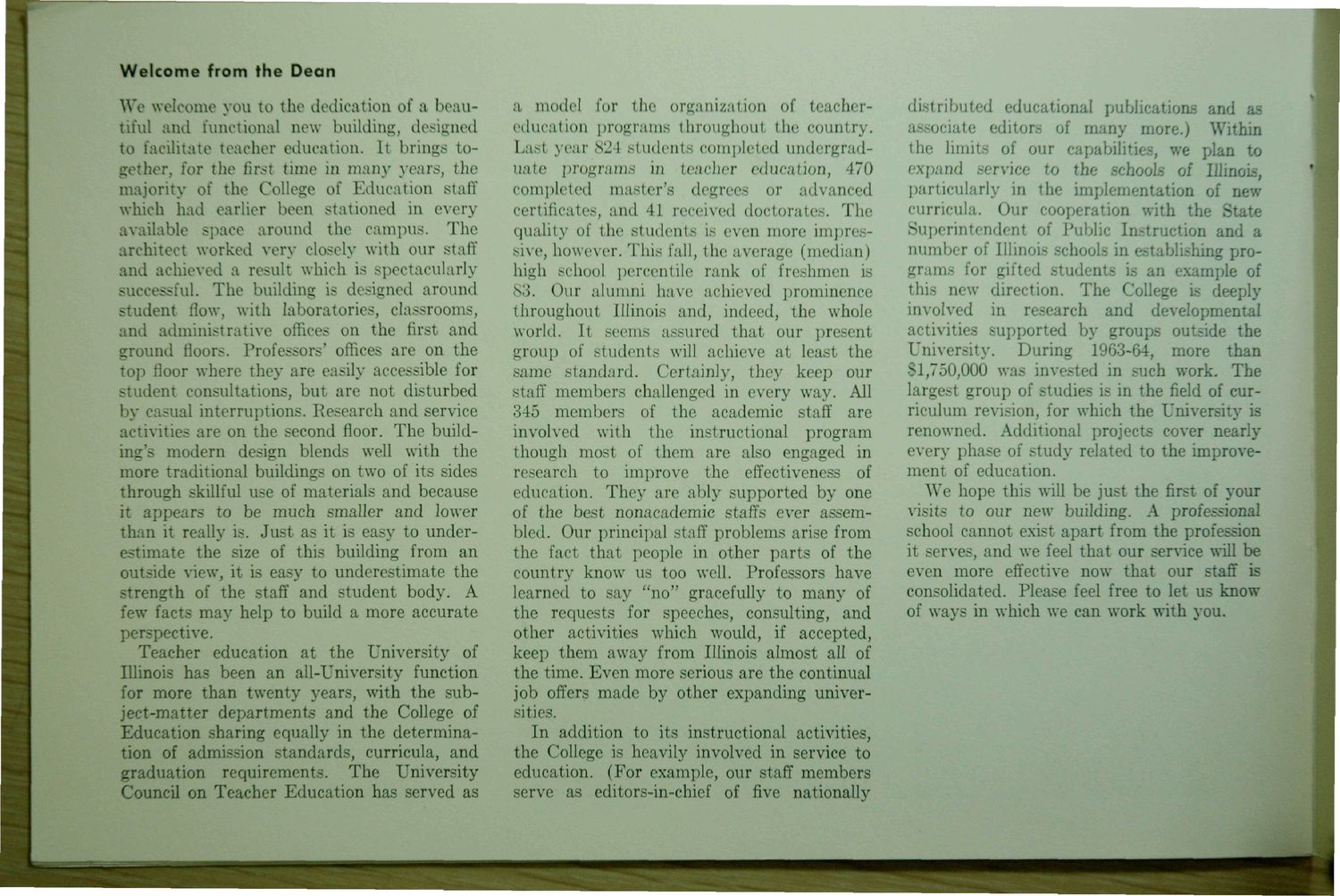| |
| |
Caption: Dedication - College of Education Dedication
This is a reduced-resolution page image for fast online browsing.

EXTRACTED TEXT FROM PAGE:
Welcome from the Dean We welcome you to the dedication of a beautiful and functional new building, designed to facilitate teacher education. It brings together, for the first time in many years, the majority of the College of Education staff which had earlier been stationed in every available space around the campus. The architect worked very closely with our staff and achieved a result which is spectacularly successful. The building is designed around student flow, with laboratories, classrooms, and administrative offices on the first and ground floors. Professors' offices are on the top floor where they are easily accessible for student consultations, but are not disturbed by casual interruptions. Research and service activities are on the second floor. The building's modern design blends well with the more traditional buildings on two of its sides through skillful use of materials and because it appears to be much smaller and lower than it really is. Just as it is easy to underestimate the size of this building from an outside view, it is easy to underestimate the strength of the staff and student body. A few facts may help to build a more accurate perspective. Teacher education at the University of Illinois has been an all-University function for more than twenty years, with the subject-matter departments and the College of Education sharing equally in the determination of admission standards, curricula, and graduation requirements. The University Council on Teacher Education has served as a model for the organization of teachereducation programs throughout the country. Last year 824 students completed undergraduate programs in teacher education, 470 completed master's degrees or advanced certificates, and 41 received doctorates. The quality of the students is even more impressive, however. This fall, the average (median) high school percentile rank of freshmen is S3. Our alumni have achieved prominence throughout Illinois and, indeed, the whole world. It seems assured that our present group of students will achieve at least the same standard. Certainly, they keep our staff members challenged in every way. All 345 members of the academic staff are involved with the instructional program though most of them are also engaged in research to improve the effectiveness of education. They are ably supported by one of the best nonacademic staffs ever assembled. Our principal staff problems arise from the fact that people in other parts of the country know us too well. Professors have learned to say "no" gracefully to many of the requests for speeches, consulting, and other activities which would, if accepted, keep them away from Illinois almost all of the time. Even more serious are the continual job offers made by other expanding universities. In addition to its instructional activities, the College is heavily involved in service to education. (For example, our staff members serve as editors-in-chief of five nationally distributed educational publications and as associate editors of many more.) Within the limits of our capabilities, we plan to expand service to the schools of Illinois, particularly in the implementation of new curricula. Our cooperation with the State Superintendent of Public Instruction and a number of Illinois schools in establishing programs for gifted students is an example of this new direction. The College is deeply involved in research and developmental activities supported by groups outside the University. During 1963-64, more than $1,750,000 was invested in such work. The largest group of studies is in the field of curriculum revision, for which the University is renowned. Additional projects cover nearly every phase of study related to the improvement of education. We hope this will be just the first of your visits to our new building. A professional school cannot exist apart from the profession it serves, and we feel that our service will be even more effective now that our staff is consolidated. Please feel free to let us know of ways in which we can work with you.
| |